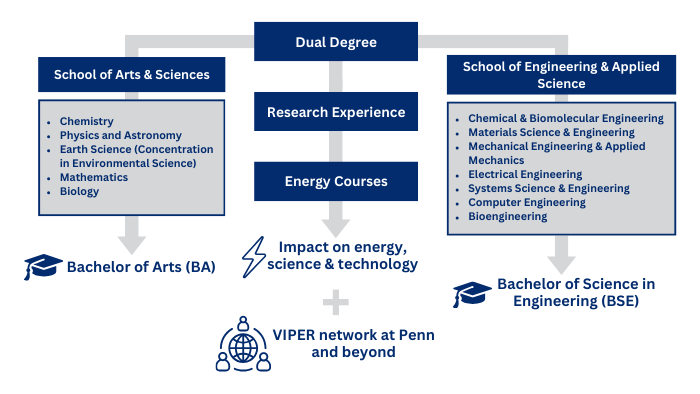Curriculum Overview
VIPER is a unique college experience that positions students to make a significant impact in the development of sustainable energy science and technology while cultivating an interdisciplinary perspective in science and engineering and forming lasting connections with a community dedicated to solving the world's energy challenges.

Dual Degree
VIPER is a coordinated dual-degree program at Penn, and our students pursue two degrees — a Bachelor of Arts in the School of Arts and Sciences and a Bachelor of Science in Engineering in the School of Engineering and Applied Science.
Click the above degrees for more information about their degree requirements and click here to see more information about VIPER-approved major options. Dual-degree students should complete at a minimum of 46 course units (CUs).
Research Experience
Students take a dedicated "Introduction to Energy Research" seminar in the first (VIPR 1200, 0.5 CU) and second year (VIPR 1210, 0.5 CU). This seminar series prepares students for their first summer of research at Penn by introducing them to current energy research topics, the challenges and techniques involved with conducting research, and strategies for reading and writing technical papers.
Throughout this course, students will receive support and guidance towards finding research opportunities with Penn faculty mentors that reflect their interests in energy science and technology. For more information about summer research support, click here.
During their time at Penn, VIPER students conduct energy research for at least 2 summers. VIPER provides substantial financial support for students to conduct research over the summer. During their first summer, students conduct research on Penn's campus. For their second summer, they have the option to explore research opportunities both at Penn and beyond at another academic institution. Additionally, VIPER students can choose to do a third summer of energy research with VIPER.
For more information on VIPER research experiences, click here.
Leadership Development
In addition to the "Introduction to Energy Research" seminar, VIPER students enroll in an asynchronous course on energy research and leadership development (VIPR 1300, 0.5 CU). Starting in their sophomore year, students take this course every semester, including summers. The course encourages students to reflect on their energy-related experiences at Penn and to explore new opportunities both within and outside of VIPER. These include attending on-campus energy talks, participating in poster sessions, engaging with alumni, and joining community-building events.
For more information on VIPR 1300, click here.
Energy Courses
Students complete at least 3 energy courses during their time at Penn. Click here for more information about energy courses at Penn.
Summary
In summary, VIPER students complete:
- Requirements for the Bachelor of Arts (BA)
- Requirements for the Bachelor of Science in Engineering (BSE)
- VIPER Requirements
- VIPR 1200 (0.5 CU)
- VIPR 1210 (0.5 CU)
- VIPR 1300 (3.5-4.5 CU)
- 2 summers of research
- 3 energy courses
Academic Standing
To remain in good standing with the VIPER program, students are required to:
- Maintain a cumulative GPA of 3.0 or higher (multiple incomplete or withdrawal grades will be taken into consideration).
- Make steady progress towards meeting their dual degree requirement.
- Make steady progress towards meeting their research requirements.
Students who do not meet these criteria will be placed on academic probation for the following semester. To regain good standing, students must:
- Regularly meet with the VIPER Managing Director to discuss their academic progress and actively engage with their advisors. These discussions should include reflecting on academic challenges and creating a plan for improvement.
- Adhere to potential restrictions on their maximum course load (CU) and update their 4-year plans accordingly.
- Achieve a minimum GPA of 3.0 during the probationary term.
Students are also encouraged to take advantage of VIPER and Penn resources, such as peer study groups, Student Health and Counseling, the Weingarten Learning Center, and the Tutoring Center to work towards their goals. Students may receive additional communications from the School of Arts and/or Sciences or School of Engineering and Applied Science regarding their academic standing.
Failure to meet the requirements to return to good standing may result in removal from the program. Students who earn an F or multiple Fs may be removed from the program immediately.
